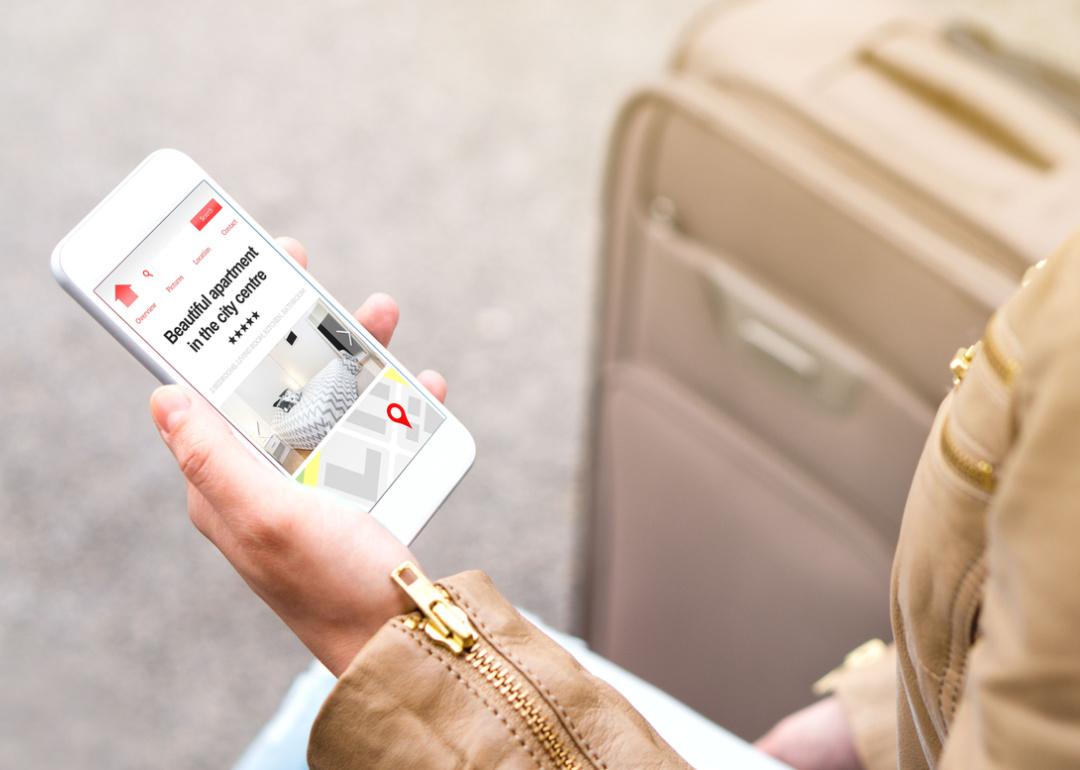The biggest scams today and how you can protect yourself from them
Published 11:45 pm Friday, December 9, 2022
AnastasiaDudka // Shutterstock
The biggest scams today and how you can protect yourself from them
Since the COVID-19 pandemic arrived in the United States in the spring of 2020, scams have been on the rise.
As a whole, we’ve spent more time online—working, shopping, and socializing—than we have ever before. With fewer interactions happening face to face, it’s much easier for folks with ill intentions to rob us of our identities, banking information, or money and get away before we’ve even realized what has happened. In fact, in 2021 alone, more than 1 in 3 reported scams were for online purchases, a major increase compared to years prior.
The Better Business Bureau published more than 46,000 scam reports in 2021—about 43% of which led to a monetary loss. Masquerading as trusted brands, potential romantic partners, and even family members, scammers conned a median of $169 out of their targets.
Using data from the BBB Scam Tracker Annual Risk Report, Stacker identified the most common and costly types of scams in 2021. Scams are ranked by the BBB risk index, which factors in a scam’s prevalence, the percentage of reports that lost money to that scam, and the median monetary loss. Since the last time Stacker published this report, two new categories—COVID-19 and cryptocurrency— have been added.
Most scams utilize the internet to rob people of their money, while others prey on your willingness to go to great lengths for those you love. Chillingly, some of the scams on our list, like home improvement scams, are the result of con artists traipsing through your home and potentially spending time around you and other family members.
Read on to find out which scams you might be most likely to fall prey to and to learn some helpful tips that can keep you from ever becoming a victim.
You may also like: 50 car companies that no longer exist
![]()

GaudiLab // Shutterstock
#27. Charity (tie)
– BBB risk index: 0.6
– Share of total scams reported: 0.5%
– Share of scams that reported a monetary loss: 20.0%
– Median reported loss: $100
Charity scams come from an organization claiming to be taking donations to help a specific cause. You donate the money only to find out the charity or cause never really existed or that the charity grossly misrepresented how much of the money was actually going to the cause. These scams can be hard to identify as many scammers go to great lengths to create social media accounts for the charity or cause and even impersonate victims.
In October 2017, a couple created a GoFundMe page for a homeless veteran and concocted a heartwarming, but false story that resulted in more than 14,000 people donating more than $400,000. To keep yourself safe, be sure to vet charities before donating using something like the BBB Wise Giving Alliance.

fizkes // Shutterstock
#27. Tax collection (tie)
– BBB risk index: 0.6
– Share of total scams reported: 0.2%
– Share of scams that reported a monetary loss: 19.1%
– Median reported loss: $236
Tax scams are one of the oldest scams to date and show no signs of slowing down. A fake IRS agent may contact you claiming that you owe taxes to be paid immediately by prepaid debit card or wire transfer with threats of arrest and hefty fines or contacting you with claims that they are sending out refunds but need your personal information to do so.
In one scenario, for which the IRS has already sent several warnings, a scammer will use your Social Security number to file a tax return in your name and then claim the refund. The biggest red flag in this scam is being pressured to act quickly. In actuality, the IRS will give you the chance to ask questions and appeal what you owe while never demanding payment over the phone or requiring that you use a non-refundable form of payment. To avoid this scam, make sure to pay your taxes in full each year and file your return as early as possible.

GaudiLab // Shutterstock
#26. Yellow Pages/directories
– BBB risk index: 0.8
– Share of total scams reported: 0.1%
– Share of scams that reported a monetary loss: 29.4%
– Median reported loss: $550
The Yellow Pages and other similar directories have decreased in popularity since the rise of the internet, but scammers are still benefiting from them. Scammers contact a company claiming to represent a directory and request basic information—address, phone number, email, etc.—before prompting the employee to confirm the listing. Later, the scammed company will receive an invoice for a few hundred dollars, and if they call to complain, the scammer will reply that the employee verbally confirmed placement in their directory and agreed to the cost.
These scams are always done over the phone making them hard to identify. But, easy ways to protect yourself and your company include educating staff and training them to ask suspicious callers questions, researching the company the caller claims to represent, asking specifically about the terms and conditions, and having a clear process in place for inspecting invoices.

DimaBerlin // Shutterstock
#24. COVID-19 (tie)
– BBB risk index: 2.7
– Share of total scams reported: 0.8%
– Share of scams that reported a monetary loss: 14.8%
– Median reported loss: $400
There are two types of COVID-19-related scams. The first is when folks obtain financial and insurance information from individuals in exchange for (what should be free) tests and vaccinations. The other involves scammers capitalizing on the increase in online shopping, stealing money or banking information from individuals through peer-to-peer payment apps, like Venmo or CashApp, under the guise of accepted virtual payment options.
To protect yourself from these scams, never give personal information to unvetted agencies or over the phone, e-mail, or text. Additionally, never use P2P payment options when buying from an unknown vendor, stick to vetted checkout processes instead.

PeopleImages.com – Yuri A // Shutterstock
#24. Health care (including Medicaid and Medicare) (tie)
– BBB risk index: 2.7
– Share of total scams reported: 1.4%
– Share of scams that reported a monetary loss: 12.9%
– Median reported loss: $250
Health care scams come in many forms, but all involve someone either wanting your personal information for identity theft—under the guise of updating your insurance—or attempting to use your insurance to submit fraudulent medical charges. Most versions also include robocalls, texts, or emails from someone claiming to be a government official wanting your information.
Never share your personal information with someone who contacts you without your request. You should instead call a trusted number from your healthcare provider to verify the legitimacy of the request.
You may also like: 15 cars that depreciated the most last year

Eugenio Marongiu // Shutterstock
#23. Moving
– BBB risk index: 3.7
– Share of total scams reported: 0.9%
– Share of scams that reported a monetary loss: 76.0%
– Median reported loss: $90
Moving can be an incredibly stressful experience, and finding out you’ve been scammed can make it infinitely worse. The most popular scam includes getting a quote from a moving company and sending a deposit, only to have the movers never show up. Another scam includes companies quoting you a rate based on item weight and then, on moving day, informing you your belongings are much heavier than projected and that the price per additional pound will be double the original quote. Moving companies can also scam you by never delivering your items, meaning either your stuff is gone forever or you have to pay a hefty “ransom fee” to return your items.
The best ways to avoid these scams are heavily researching to ensure the company’s legitimacy, keeping an inventory of your belongings, getting everything in writing, and never sending a full payment in advance of the move.

fizkes // Shutterstock
#21. Family/friend emergency (tie)
– BBB risk index: 4.5
– Share of total scams reported: 0.4%
– Share of scams that reported a monetary loss: 26.1%
– Median reported loss: $800
Family/friend emergency scams prey on your love for your nearest and dearest and your willingness to do whatever it takes to ensure their safety and happiness. Scammers will contact you, claiming to be someone you know in a dire situation and need money. Scammers will also scour social media accounts learning minute details—like nicknames and travel plans—to legitimize their stories.
Resist the urge to act immediately and call your friend or family member directly. If you can’t reach them, speak to others who may know of their whereabouts. Double-checking these stories is the only surefire way to avoid this scam.

Cast Of Thousands // Shutterstock
#21. Utility (tie)
– BBB risk index: 4.5
– Share of total scams reported: 1.2%
– Share of scams that reported a monetary loss: 12.3%
– Median reported loss: $500
Utility scams are seasonal, often happening in the summer and winter when people depend on air conditioning or heat. Scammers pose as water, electric, or gas company representatives and contact you, threatening service deactivation if a certain fee or bill is not paid immediately.
As noted by the BBB, the biggest red flag for this scam is when a company requests you pay with a prepaid debit card or wire transfer. A legitimate utility company will always accept a check or credit card payment. Never allow a utility worker into your home unless you have a pre-scheduled appointment, and always call customer service to verify any requested payments.

Canva
#20. Foreign money exchange
– BBB risk index: 5.1
– Share of total scams reported: 0.1%
– Share of scams that reported a monetary loss: 27.8%
– Median reported loss: $3,724
Foreign money exchange is a scam being phased out as most millennials are aware of it and on guard against it. The most popular version begins with a fake Nigerian prince or a wealthy businessman who will spin a sad story, over email, about how they have had to flee Nigeria but have left their money and valuables behind. The scammer pleads for your help to retrieve their belongings and money, and in return, promises to award you a few of their millions. What follows are the additional fees, bribes, taxes, and legal costs after the initial bank transfer you agreed to—all of which you will be asked to pay upfront.
The easiest ways to avoid this scam are by never sending money to a person you only know via email, being wary of strangers offering you large sums of money, and always being suspicious of transactions that involve additional and hidden fees.

fizkes // Shutterstock
#19. Credit card
– BBB risk index: 5.6
– Share of total scams reported: 1.8%
– Share of scams that reported a monetary loss: 38.0%
– Median reported loss: $139
Credit card scams are very similar to identity theft scams and often share the same end goal: to make unauthorized transactions or steal your identity. Scammers will contact you, claiming to be your bank or credit card company, and ask you to verify your account information. Occasionally, the scam will be done over an email requesting you click a link to confirm your information, but instead, the link downloads malware to your device.
To entice you to give your information, these scammers often offer a better interest rate, inform you that they need to send you a new card as your old one has been compromised, or tell you that they need to verify a charge.
In order to avoid this, consider how your bank or credit card company usually contacts you and check directly with your bank or credit card company using a trusted customer service number to verify the request or offer.
You may also like: States where food stamps are used the most

Canva
#18. Debt collection
– BBB risk index: 6.1
– Share of total scams reported: 3.0%
– Share of scams that reported a monetary loss: 7.8%
– Median reported loss: $450
Scammers running debt-collection scams are particularly scary because of how persistent they can be. Scammers will call claiming to work for a debt collection agency or a government office and need to collect a debt you owe immediately. They may threaten you with consequences if you refuse—wage garnishment, arrest, court appearances, etc. If that fails, they will continue contacting you until you give in.
Stay on top of your debts and track what you owe and to whom. In the United States and Canada, debt collectors must notify you of your debt in writing—a “validation notice.” They are not legitimate if a company can’t or won’t provide this.

DenPhotos // Shutterstock
#17. Identity theft
– BBB risk index: 6.2
– Share of total scams reported: 1.9%
– Share of scams that reported a monetary loss: 19.8%
– Median reported loss: $283
In 2017 alone, 16.7 million individuals were impacted by identity theft, and more than $16.8 billion dollars were stolen. With the right information, scammers can steal and use your identity to open a line of credit in your name, take money out of your bank accounts, or obtain services that they never pay for—to name a few.
Identity theft can be hard to uncover, as scammers often go to great lengths to keep you unaware such as ensuring all bills and statements are sent to an alternative address. Make sure to regularly check your accounts for unexplained withdrawals and check your credit score often to ensure no unauthorized accounts have been opened in your name. You should also carefully guard your personal information—keeping all personal documents in a secure location and never giving out information to unsolicited callers.

Tero Vesalainen // Shutterstock
#16. Sweepstakes, lottery, and prizes
– BBB risk index: 7.2
– Share of total scams reported: 4.5%
– Share of scams that reported a monetary loss: 13.3%
– Median reported loss: $200
If you haven’t entered a contest, sweepstakes, or lottery, you are not eligible to win its prize. An email or phone call alerting you that you have won that prize and can collect it at any time after paying taxes and fees via a prepaid debit card or wire transfer is most definitely a scam. The same goes for a foreign lottery letter telling you you’ve won the jackpot. In the United States and Canada, citizens can’t enter foreign lotteries by phone or mail—meaning you would have had to visit the country to enter.
Keeping track of any contests, sweepstakes, or lotteries you do enter is the best way to avoid falling prey to this scam. Remember that a legitimate sweepstakes company will never ask you to pay upfront fees to claim a prize.

Blue Planet Studio // Shutterstock
#15. Counterfeit product
– BBB risk index: 12.3
– Share of total scams reported: 3.5%
– Share of scams that reported a monetary loss: 66.7%
– Median reported loss: $90
For a consumer who’s been lusting over a $1,300 handbag for months, finding the same bag on a different retailer’s website for only $700 may seem like a dream come true. The reality is often far from dreamy as this handbag hopeful probably just fell prey to a counterfeit product scam.
Counterfeit goods mimic designer goods right down to the trademarked logo but are made with inferior materials and workmanship and are sold online—sometimes through reputable sites, in flea markets, by street vendors, and in traditional retail stores for majorly reduced prices. Avoid sketchy retailers, choose to stick to the source or authorized sellers, and be wary of too-good-to-be-true prices.

WOVE LOVE // Shutterstock
#14. Romance
– BBB risk index: 12.5
– Share of total scams reported: 0.6%
– Share of scams that reported a monetary loss: 36.6%
– Median reported loss: $900
Romance scams have increased as online dating and social media apps make it easy to have an entire relationship with someone you’ve never met. The scams essentially all work the same way: Someone will make a fake online profile on a dating or social media site to connect with you, and after chatting and exchanging pictures, will offer some excuse as to why they cannot meet in person—they’re in the military, visiting family, working overseas, etc.
Once they sense an emotional connection, the scammer will make their move asking you for money perhaps to come and visit or for an emergency. After you’ve sent the money, they vanish from your life altogether, leaving behind the fake profile to strike again from a new one. Keep an eye out for red flags like the relationship moving more quickly than normal, excessive talk about trust, a refusal to meet you in person, too many “hard luck” stories, and language that doesn’t seem to match up with their claims.
You may also like: Iconic car debuts from the year you were born

mapo_japan // Shutterstock
#13. Rental
– BBB risk index: 13.4
– Share of total scams reported: 0.9%
– Share of scams that reported a monetary loss: 49.5%
– Median reported loss: $504
Especially for those in major cities where the rental market is tough, finding a new place to live can be difficult. In an effort to make the exhausting process easier, many skimp on their research and rush into agreements to have the taxing process over with. Scammers prey on these situations, luring you in with online ads of beautiful listings at low prices before telling you that time is short, others are interested, and immediate action is required to secure the listing.
After paying a hefty security deposit, the first and last month’s rent, and an agent’s fee, you discover the property is unavailable and maybe never even existed. ApartmentList reported that 43.1% of renters have encountered a fraudulent listing, and 5.2 million renters have lost money because of rental scams. Be wary of rentals that seem too good to be true and insist on seeing the listing in person before sending any money.

Canva
#12. Credit repair/debt relief
– BBB risk index: 14
– Share of total scams reported: 1.2%
– Share of scams that reported a monetary loss: 32.7%
– Median reported loss: $600
Scammers will contact you promising a specific credit score or a reduction or total elimination of your debt as long as you pay an upfront fee. You pay the fee, and nothing changes except that you are now out money that you could have put towards the debt you owe. Never believe in guarantees and always avoid advance fees. In the United States, credit repair and debt relief companies can only collect money after performing the promised services.

NicoElNino // Shutterstock
#11. Phishing
– BBB risk index: 17.6
– Share of total scams reported: 11.9%
– Share of scams that reported a monetary loss: 9.30%
– Median reported loss: $270
Phishing scams can be the hardest to identify as they come in such a wide variety of forms. The most common are emails either claiming you have won a prize and need to claim it or owe something and threatening consequences if unpaid. Sometimes these emails include a PDF, either linked or as an attachment, which downloads malware to your computer and steals your personal information.
Keep yourself safe by never opening anything from an unrecognized email address and being wary of emails that contain only the most general information—your name is excluded from the email, or the last four digits are absent from the credit card on which they are claiming payment is due.

Tero Vesalainen // Shutterstock
#10. Travel and vacation
– BBB risk index: 20.3
– Share of total scams reported: 0.9%
– Share of scams that reported a monetary loss: 56.5%
– Median reported loss: $700
One of the most common travel and vacation scams is similar to a rental scam. A con artist will post a listing for a vacation rental that either doesn’t exist or doesn’t look as pictured, pressure you into acting quickly, and then ask you to submit a deposit before vanishing into the night with your money (and the beach house of your dreams).
Another common version preys on those looking to sell their timeshares. A real estate broker or agent, who claims to specialize in timeshare resales, will call claiming to have dozens of potential buyers, and offer to expedite the selling process if only you’ll pay a small upfront fee. Talk to the owner of the vacation home you’re looking to rent, check public records and online reviews to make sure the location matches the description, and never pay any kind of upfront fees via prepaid debit cards or wire transfers.

Pheelings media // Shutterstock
#9. Tech support
– BBB risk index: 22
– Share of total scams reported: 3.1%
– Share of scams that reported a monetary loss: 24.3%
– Median reported loss: $500
For many of us, there would be nothing worse than losing all of the data on our computers or having them rendered useless by viruses. Those running tech support scams know this and have invented clever ways to steal your money by preying on this fear. Posing as tech support staff from well-known computer companies—Dell, Norton, or Microsoft—scammers will call informing you that your computer is infected, or a pop-up will appear alerting you that something is wrong and giving you a number to call.
When you call, the scammer will offer to fix the problem if you pay a fee. They may even ask for remote access to fix the problem and then install malware to steal your personal information. Never grant access to your computer, know that legitimate tech companies would not call out of the blue, and shut down your computer when a suspicious pop-up appears.
You may also like: 50 most popular chain restaurants in America

Ground Picture // Shutterstock
#8. Government grant
– BBB risk index: 24.8
– Share of total scams reported: 2.2%
– Share of scams that reported a monetary loss: 19.5%
– Median reported loss: $1,000
The government is not in the business of offering free money to random people “just because.” Getting a government grant is a long, involved process and is only initiated when you take the first step. Anyone reaching out to you telling you otherwise—perhaps with claims that you have been awarded a grant you won’t have to repay as long as you pay a few small upfront fees—may be trying to pull a government grant scam over on you.
There are hundreds of fake “look-alike” agencies out there, so always double-check any grant agency contacting you against the only official list of all U.S. federal grant-making agencies.

fizkes // Shutterstock
#7. Advance fee loan
– BBB risk index: 25.9
– Share of total scams reported: 1.8%
– Share of scams that reported a monetary loss: 40.6%
– Median reported loss: $609
Many scams prey on financially unstable people, and advance fee loan scams are no exception. In this scam, a loan broker will promise you a substantial loan, regardless of your credit history or score, after you pay an upfront fee or “insurance.” Of course, as soon as you do, the loan broker and all the money you promised are gone.
While various fees are associated with loans, they are always communicated clearly and taken from the money you are being loaned. Real lenders will never guarantee a loan before checking your credit history and will never accept strange fee payment forms like gift cards, prepaid debit cards, or wire transfers.

Pheelings media // Shutterstock
#6. Fake check/money order
– BBB risk index: 27.1
– Share of total scams reported: 2.1%
– Share of scams that reported a monetary loss: 14.8%
– Median reported loss: $1,475
Fake check and money order scams can be hard to peg down as con artists use various stories and situations to steal your money. Often you will receive a check worth far more than what was expected. A scammer will then ask you to deposit the check and wire back the difference saving them the trouble of canceling that check and sending over another. Forged checks often take weeks to be uncovered, and by the time the check bounces, the extra money you thought you had, plus the difference you wired back to the scammer, will be gone.
Always be aware of overpayments, especially gross overpayments. If you receive a much larger check than you were expecting, send it back; otherwise, you may be on the hook for funds used against the amount.

wutzkohphoto // Shutterstock
#5. Investment
– BBB risk index: 29.9
– Share of total scams reported: 0.8%
– Share of scams that reported a monetary loss: 56.9%
– Median reported loss: $1,100
Con artists put a lot of effort into their scams to make them convincing; investment scams are the best example. In the most basic version of this scam, you’ll be convinced to invest in a project, company, or loan, but when you try to withdraw your money, find what you invested in never really existed. Another common investment scam is a Ponzi scheme; think Bernie Madoff’s Bernard L. Madoff Investment Securities.
Educate yourself about investments and industry regulations before getting involved with a project, and keep your eyes peeled for too-good-to-be-true buzzwords.

Dusan Petkovic // Shutterstock
#4. Home improvement
– BBB risk index: 45.2
– Share of total scams reported: 1.4%
– Share of scams that reported a monetary loss: 59.1%
– Median reported loss: $955
One of the few in-person scams on this list is the home improvement scam, which starts with a knock on your door and a contractor offering services at a below-average price, often claiming they’re finishing another project in the neighborhood and can squeeze you in if you act now. They will then either ask for a deposit and walk away with it, find dozens of “additional issues” after they’ve begun work that you’ll need to pay for, or coax you into signing away your insurance payment.
Always check a contractor’s references and reviews before allowing them to start work, be wary of huge upfront costs and high-pressure deals, insist on having a written contract before work begins, and ask to see a contractor’s business license, permits, and other official documents validating their legitimacy.
You may also like: Marijuana violations are taking truck drivers off the road, adding more supply chain disruptions

PaeGAG // Shutterstock
#3. Employment
– BBB risk index: 63
– Share of total scams reported: 7.8%
– Share of scams that reported a monetary loss: 15.1%
– Median reported loss: $900
Employment scams happen when con artists pose as legitimate companies recruiting or hiring. After receiving your application, they’ll hire you almost immediately, usually without a proper interview, and request your banking information to set you up for a direct deposit or charge you for training.
Keep in mind that some jobs—those without special training, licensing, or educational requirements like secret shoppers and customer service reps—are more susceptible to this scam than others. Be aware of any out-of-the-ordinary hiring procedures, like being offered a job without an interview.

Prostock-studio // Shutterstock
#2. Cryptocurrency
– BBB risk index: 90.6
– Share of total scams reported: 1.9%
– Share of scams that reported a monetary loss: 66.2%
– Median reported loss: $1,200
The average person doesn’t have a solid understanding of what, exactly, cryptocurrency is or how it works, which makes it easy for scammers to prey on them. According to the FTC, cryptocurrency scams run the gamut from folks impersonating romantic interests and established businesses who demand payment in cryptocurrency to so-called investment managers promising to grow your wealth at an unbelievable rate.
Keep an eye out for investment managers or businesses who reach out to you unprompted, returns that seem too good to be true, and investment opportunities that don’t include details or explanations.

Bigc Studio // Shutterstock
#1. Online purchase
– BBB risk index: 167.4
– Share of total scams reported: 37.4%
– Share of scams that reported a monetary loss: 74.9%
– Median reported loss: $101
Online purchase scams often happen on direct seller-to-buyer sites like eBay and Craigslist. If you’re the seller in this scam, you might agree to sell your item outside the site’s routine checkout process and opt to receive payment by cashier’s check or money order only to have the buyer run a fake check/money order scam.
If you’re the buyer, you’ll purchase an item or service only to never receive what was ordered and paid for. To keep yourself secure, only use websites and online marketplaces that offer protection to buyers and sellers, and never agree to exchanges outside the usual checkout process.






